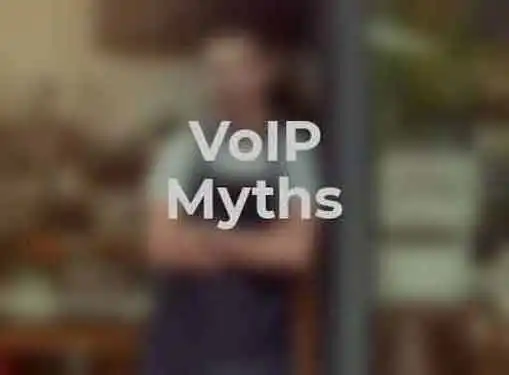Telecommuting
Exploding VoIP System Myths
Written by Jay Shapiro for Gaebler Ventures
VoIP isn't quite ready to take over the PBX system. It can't step up to the mark say as an emergency or lift phone. And because VoIP relies on an electric supply it is vulnerable in the event of power failure. Right now there's room for both VoIP and PBX systems or old school analogue phones in business.
In the last decade VoIP systems for business phones have been hailed as one of the hottest growth markets in the communications industry.

Many companies now use VoIP and believe doings so can help cut costs, improve productivity and give businesses valuable features that traditional phone services can provide.
Despite the boom in the popularity and effectiveness of VoIP there is still a feeling of reticence surrounding the technology.
These are the most common VoIP misconceptions:
1. If you pay a high price, you'll get a better service -
The old chestnut, 'You get what you pay for' is true in many circumstances. However, a common confusion about VoIP is that you have to pay high fees to get more in terms of service. This isn't strictly true. Because VoIP doesn't work within the limits of a conventional old school telephone system, things work differently.
VoIP Salespersons who earn mostly on a commission basis are driven toward a system that offers them greater rewards, rather than one which offers you more value for your money. If you pay more for the service, it is very likely going into the company's pocket and not toward offering you extras.
2. VoIP is complex -
Hosted VoIP telephone systems do not need to be complex. There are firms that require custom systems to be compatible with their existing IT systems. And this can be done with VoIP. But, some customers want nothing more than a dependable, inexpensive and professional service. Some plug 'n' play internet systems can be put in place for less than $25.00 per month.
3. The VoIP system is the same as traditional phone systems -
This is not true. VoIP is not the same as old school phone systems. Far from it, it doesn't work with the restrictions of the traditional method.
For example: Say you wanted to be able to make and receive several calls at once. Traditional methods wouldn't allow this to happen, the caller would receive an engaged tone. With VoIP, if you purchase ten phones, you can ten phones all at the same time.
You also get better monitoring with VoIP. VoIP phones can connect to remote locations, so you can use the system in one city to see what phone usage is occurring in another. This facility allows you to see who is on the phone and the number they are connected to.
4. Geographic numbers aren't an option -
This is perhaps one of the biggest myths. With VoIP you can have geographic numbers, although some traditional telecommunications companies may prevent you from transferring existing phone numbers to the VoIP network.
5. Traditional switchboards are cheaper on lease -
Old-fashioned PBX systems are necessarily cheaper to lease and they are well on the way to becoming obsolete but not for a good while yet it seems. By contrast a hosted VoIP system provides a free, albeit virtual, PBX and in some cases the handsets are free too.
Jay Shapiro is a freelance writer based in the UK. Jay has a particular interest in the emotive aspects of the entrepreneur's character. "Alongside the nuts and bolts of business, the character of the person is often the ingredient responsible for success."
Share this article
Additional Resources for Entrepreneurs




Conversation Board
We greatly appreciate any advice you can provide on this topic. Please contribute your insights on this topic so others can benefit.